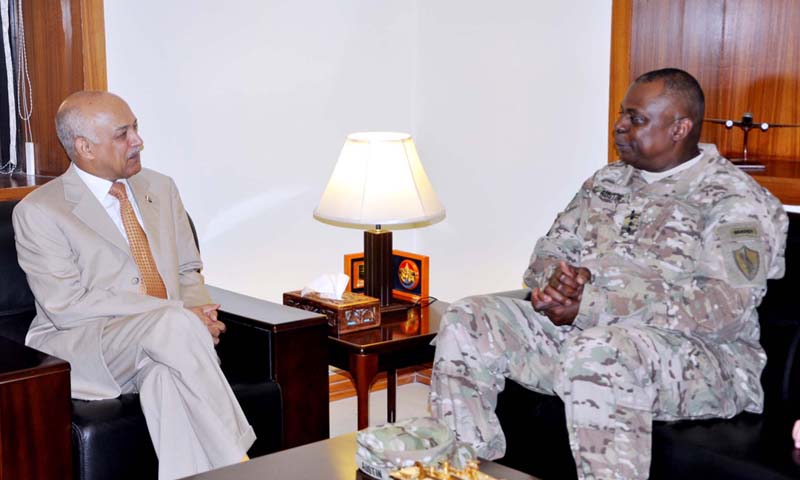ISLAMABAD: The United States will continue to reimburse the cost incurred by Pakistan in support of the war on terror, through the Coalition Support Fund (CSF) for keeping the vacillating bilateral relationship on a “solid footing”.
Commander of the United States Central Command (US Centcom) Gen Lloyd Austin met Secretary of Defence retired Lt Gen Asif Yasin Malik on Friday at the defence ministry headquarters in Rawalpindi to discuss defence relations and the pullout of coalition forces from Afghanistan.
A defence ministry statement issued by its press officer after the meeting quoted Gen Austin as telling the defence secretary that: “Continued support in training, education and Coalition Support Fund (CSF) will act as tools necessary to keep relations on solid footing.”
The Centcom commander described Pakistan as America’s vital partner for regional security besides being an important country for American national security interests. He noted that defence relations between the two countries were progressing on an upward trajectory.
Pakistani leaders had been keenly awaiting a US decision on the future of the Coalition Support Fund (CSF), which is essentially the reimbursement of the costs the country incurs on operations conducted in support of the US war on terror.
The CSF is the centerpiece of post-9/11 Pak-US defence cooperation. It is drawn from a presidentially designed and congressionally authorised money, but the US Department of Defense has enormous discretion and authority under this programme. Though there have been differences between the two countries in the past on disbursement procedures and auditing of the fund, which quite often led to backlogs, Pakistani leaders see it as an important source for building their foreign exchange reserves.
It is an open secret that funds received under the CSF have been used for budgetary support.
The CSF has accounted for nearly half of US financial transfers to Pakistan from 2001 to June 2013. Pakistan has since 2001 received about $11 billion under this head from the US. The amount equals roughly one-fifth to one-quarter of Pakistan’s total military expenditures during this period.
Gen Austin appreciated Pakistan’s role in facilitating drawdown of US and Isaf forces.
Pakistan has lately started playing a more pro-active role with regard to facilitating the reconciliation process in Afghanistan and late last month released a top detained Taliban leader Mullah Abdul Ghani Baradar who was considered crucial for reviving the stalemated peace process. Though the move is yet to produce any result Pakistan’s role has been appreciated by all stakeholders.
Islamabad had earlier helped in setting up Taliban’s political office in Doha, which was closed down shortly after its opening due to a controversy over the name and flag of Taliban.
At the same time, Pakistan has been helping transportation of US/Isaf military assets out of Afghanistan.
Senate Defence Committee chairman Senator Mushahid Hussain said the drawdown of coalition forces from Afghanistan would be the biggest logistical exercise after World War-II in military terms since 750,000 pieces of armaments, ammunition, equipment and vehicles worth $35 billion would have to be taken out of Afghanistan, 70 per cent through Pakistan and the rest through the Northern Distribution Network via Central Asia.
Pakistan and the US are set to resume their Strategic Dialogue next year after remaining suspended for over two years due to challenging events of 2011 which included a US attack on the Salala border checkpost which left 18 Pakistani troops dead.
Prime Minister Nawaz Sharif has been invited by President Obama to Washington on Oct 23, where the two leaders are expected to look at ways to take forward the relationship.
During his two-day stay in Islamabad, the Centcom chief also met Chief of Army Staff Gen Ashfaq Parvez Kayani and Chairman of the Joint Chiefs of Staff Committee Gen Khalid Shameem Wynne.
A statement issued by the US Embassy said: “General Austin reaffirmed the importance of the US-Pakistani security relationship to regional stability. They (Gen Austin and his Pakistani interlocutors) agreed to continue to meet periodically to further common objectives on cross-border cooperation and regional security.”













































